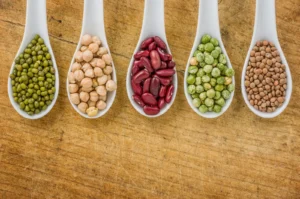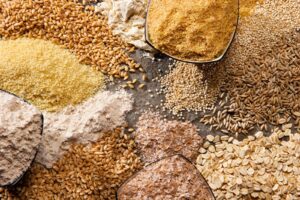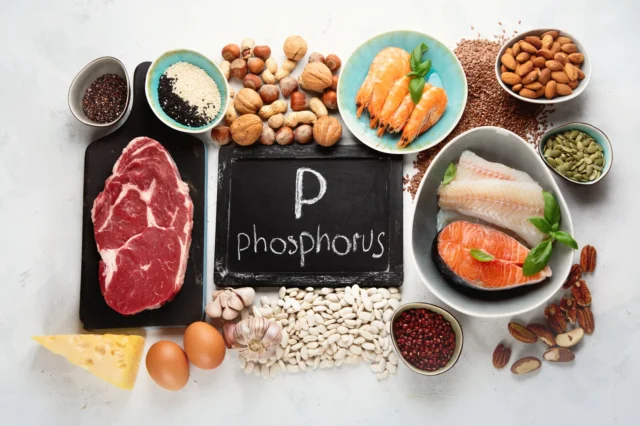Foods Rich in Phosphate
Phosphorus is a vital mineral found in every cell of the human body, primarily in the form of phosphate. It plays a crucial role in bone and teeth formation, energy metabolism, and cellular repair. The body absorbs phosphate from various food sources, and consuming foods rich in phosphate is essential for maintaining overall health.
Functions of foods rich in phosphate in the body
Phosphate plays a crucial role in various biological processes, including contributing to bone and teeth health by being a key component of bones and teeth alongside calcium, supporting energy production as part of ATP (adenosine triphosphate), aiding cellular function and repair through phospholipids that are vital for cell membrane structure, maintaining pH balance to regulate the body’s acid-base equilibrium, and supporting muscle and nerve function by being necessary for muscle contractions and nerve signaling, making it essential for overall body function and health.
Top Food Sources of Phosphate
1. Animal-Based Sources
Animal products are some of the richest sources of bioavailable phosphate, meaning the body can easily absorb them.
Dairy Derivatives :

Dairy derivatives, including milk (available in whole, skim, or low-fat options), cheese (such as cheddar, mozzarella, and Swiss), and yogurt (whether plain, Greek, or flavored), serve as rich sources of phosphate, which play a crucial role in bone strength, nerve function.
Meat and Poultry :

Beef (including steak, ground beef, and liver), chicken (such as breast, thigh, and liver), and turkey are rich sources of phosphorus, making them excellent choices for a balanced, nutritious diet that supports bone health and overall well-being.
Seafood :

Phosphate can be obtained from various seafood sources, including salmon, tuna, sardines, shrimp, and crab, all of which are rich in essential minerals that support bone health, energy production, and cellular function.
Eggs :

Egg yolks are a rich source of phosphorus, an essential mineral that plays a crucial role in bone health, energy production, and cellular function.
2. Plant-Based Sources
Vegetarians and vegans can also get phosphate from a variety of plant-based foods, though the bioavailability may be lower compared to animal sources.
Legumes and Pulses :

Phosphate can be obtained from various plant-based sources, including lentils, chickpeas, black beans, and soy products such as tofu, tempeh, and soy milk. These foods are rich in essential minerals that support bone health, energy production, and cellular function.
Nuts and Seeds :

Almonds, walnuts, sunflower seeds, pumpkin seeds, and flax seeds are excellent sources of this essential mineral, which plays a key role in bone health, energy production, and cell repair.
Whole Grains :

Brown rice, oatmeal, whole-wheat bread, and quinoa are rich in phosphorus. making these whole grains excellent nutritional sources.
3. Processed and Fortified Foods

Many processed foods, such as soft drinks (containing phosphoric acid), processed meats (like hot dogs, sausages, and bacon), fast foods (including burgers, fried chicken, and pizza), instant foods (such as noodles, frozen meals, and canned foods), and baked goods (with phosphate-enriched flour and breakfast cereals), contain phosphate additives, which significantly increase phosphate levels in the body, potentially leading to adverse health effects like kidney damage, bone weakening, and cardiovascular issues when consumed excessively over time.
Daily Phosphate Requirements
The recommended daily intake (RDI) for phosphorus varies by age and life stage, with infants aged 0-6 months needing 100 mg, those 7-12 months requiring 275 mg, children aged 1-3 years needing 460 mg, children 4-8 years requiring 500 mg, teens aged 9-18 years needing 1,250 mg, adults aged 19+ requiring 700 mg, and pregnant and lactating women needing between 700-1,250 mg, as phosphorus plays a crucial role in bone health, energy metabolism, and cellular function across all stages of life.
Effects of Phosphate Imbalance
Phosphate deficiency (hypophosphatemia), though rare, can arise from malnutrition, chronic alcohol abuse, or specific medical conditions, leading to symptoms such as weak bones (osteomalacia), fatigue, muscle weakness, and irregular heartbeat, while also potentially causing respiratory failure, anemia, and impairing cellular function due to phosphate’s essential role in energy metabolism and bone health.
Excess phosphate, or hyperphosphatemia, is typically caused by kidney disease, excessive dietary intake, or phosphate additives in processed foods, and can lead to symptoms such as calcification of soft tissues, an increased risk of cardiovascular disease, and weakened bones due to calcium loss, potentially resulting in long-term health complications like arterial stiffness, organ damage, and impaired bone mineralization.
Tips for Maintaining a Healthy Phosphate Balance
To support kidney function and phosphate excretion, consume a balanced diet with a mix of animal and plant-based sources, limit processed foods and soft drinks high in phosphate additives, stay hydrated, and consult a doctor if you have kidney disease to discuss phosphorus intake restrictions, as maintaining proper phosphorus levels is essential for preventing kidney damage and promoting overall health.
Phosphate is an essential nutrient that plays a critical role in maintaining health. By consuming a well-balanced diet with natural sources of phosphorus, you can support bone strength, energy production, and overall well-being. However, excessive intake from processed foods should be avoided to prevent health complications.
Read more to know the benefits of magnesium





[…] sunflower seeds, pumpkin seeds, and cashews are excellent sources of magnesium, zinc, and phosphorus. These minerals contribute to bone health, immune function, and energy […]